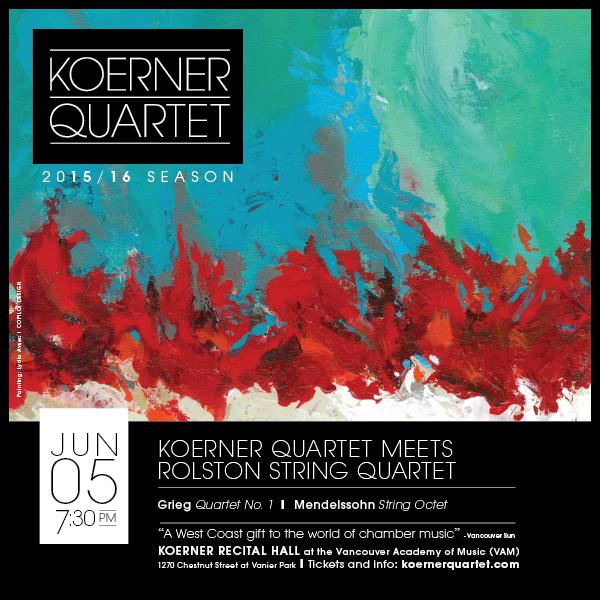On Sunday evening, June 5, the Koerner Quartet finished its 15/16 season with a concert that featured the Rolston String Quartet at the Koerner Recital Hall. It was my first time seeing this esteemed group perform on stage. They played Claude Debussy’s String Quartet in G minor, Op. 10. Immediately preceding them was the talented ensemble-in-residence, the Rolston String Quartet from Rice University’s Shepherd School of Music. They performed Franz Joseph Haydn’s String Quartet, Op.88 no. 1. The finale of the evening featured the two quartets coming together to play Octet in E-flat Major. Op.20 by Felix Mendelssohn.
For me, the beauty of listening to classical music pieces live in a concert hall is two-fold.
First, this is one of the rare settings where you can fully appreciate the entirety of the musical composition. For the reason that it is a rare opportunity to come by where one can sit in an intensely quiet, enclosed space, over the duration of close to 2 hours and do absolutely nothing else but simply listen.
Having an opportunity to do exactly this through a live concert is especially important for classical music because many pieces in the genre requires high levels of attention and focus to appreciate. In a sense, the music cannot easily fit as an afternoon running jam or a mix to play in the background whilst house cleaning. The intricacies of the composition take concentration to unravel and comprehend.
I liken listening to classical music to watching an intense movie. If I want to follow along with the story my first time through, I better put away my phone and be able to sit tight from start to finish. Sure, if I watch the movie a second or third time through, I will have memorized parts of the plot and can allow myself to fill in the blanks while doing others.
On a separate note, this is precisely why I cannot to listen to classical music pieces I have never heard before with my earphones on the bus or any other potentially loud setting. The dynamics of classical music pieces range from extremely loud to extremely quite and no volume setting on my device is a happy medium to catch both ends of the spectrum. As such, for me, listening to classical music pieces on the bus is like trying to watch a movie with certain scenes blacked out; a frustrating and unsatisfying experience.
The second reason that makes attending classical music performances a beautiful experience lies in the more obvious fact that you actually get to see a musician’s talent and ability on display before your eyes. Just like singers will wow audiences with the notes they hit seemingly effortlessly and without fail, violinists like Nicholas Wright, Jason Ho, Luri Lee, and Jeffrey Dyrda, move their bows with a precision and speed that leaves you awestruck.
I especially enjoyed watching the cellists, Joseph Elworthy and Jonathan Lo, pluck strings in unison for the Mendelssohn number of the evening. In addition, watching the movements of the viola instrumentalists, Byron Hitchock and Hezekiah Leung, I was reminded once again of how remarkable individual human beings can be. I have no doubt the process by which each instrumentalist of the two quartets mastered their trade was wrought with much practice, sweat, blood and tears.
In light of the hard work, their eventual progression to being able to play the classical musical pieces performed on Sunday evening, among other more impressive ones I am sure, is a testament to human ability. This is something that no matter how great technology becomes at copying human skill will never be able to replicate.
Written By Christine Kim

